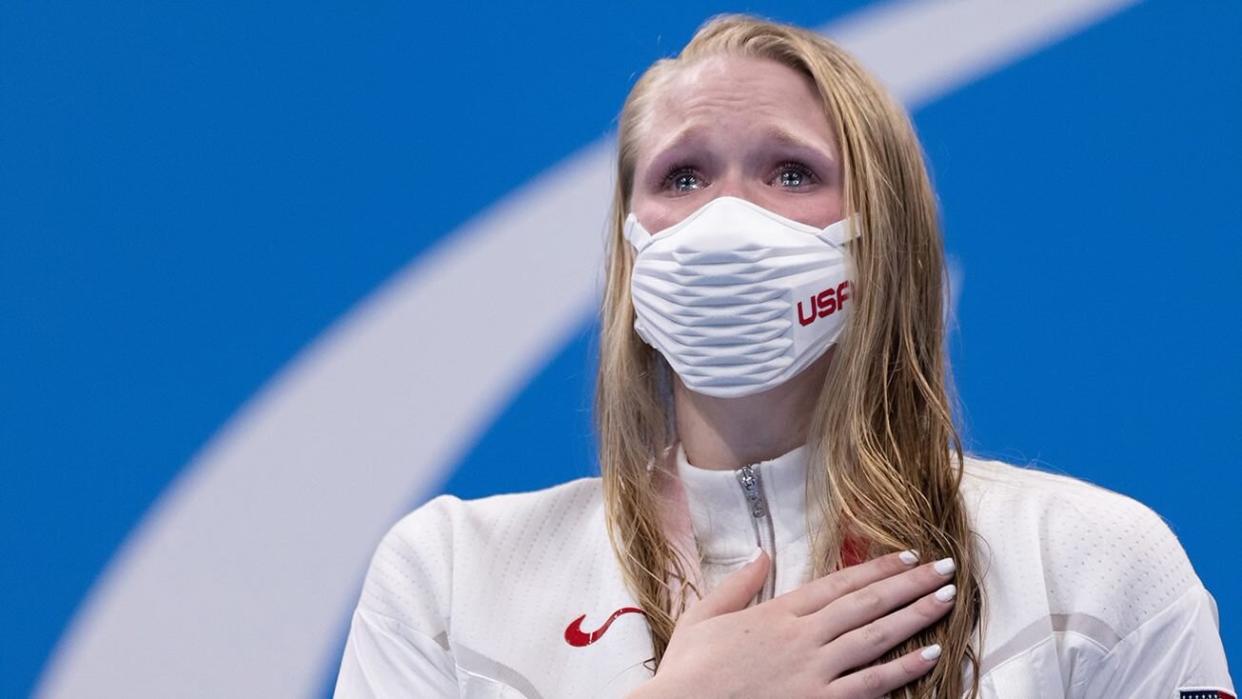North Carolina's Hannah Aspden Wins Gold in Second Paralympic Appearance

- Oops!Something went wrong.Please try again later.
U.S. Paralympic Swimming
Hannah Aspden's coach at Queens University in Charlotte, North Carolina, doles out a lot of life lessons and mottos to his swimmers in catchy phrases. "Embrace the chaos" is one. That means that life is inherently messy and unpredictable, and it's best to just be open to the uncertainty that can often lead to unexpected joys and triumphs.
Aspden's favorite of all the sayings, though, is "Control what you can control." It's something she has repeated often in the past year after the coronavirus pandemic hit, scrapping the 2020 collegiate swimming championship then derailing her hopes for the 2020 Tokyo Paralympics. It then led her to stay home in Raleigh to train and learn remotely rather than return to her collegiate team for her junior year.
And it's helped in her preparation for those delayed Tokyo Paralympic games, which are now underway.
"That's been something that I've definitely been holding with me and reminding myself because there are so many things that are out of our control and so many things that we just kind of have to roll with," Aspden told Southern Living. "And so, focusing on what we can do."
It is advice that has, in fact, served her well for her entire life.
Born with a congenital hip disarticulation and without a left leg, Aspden started swimming when she was 4. She was a natural. She began competitive swimming at age 8 and made her first national team at age 13.
Having one leg means her arms are that much more powerful, both from using them to navigate the world with crutches and from being the main propulsion force in the water.
Aspden specializes in backstroke and was recruited by coach Jeff Dugdale to be a part of Queens' team, which has won five straight Division II national titles.
"I'm lucky to have an opportunity that not a whole lot of para-athletes get, which was to be on a college team, swimming in the college meets, and just really be supported by everyone there," Aspden said. "So, I'm really thankful for that."
But swimming on her college team is also something that helped both her and her coach, Dugdale, learn and appreciate all the ways that she is different from her teammates -- all the ways that help her to thrive at the Paralympics.
"I definitely wanted to come into Queens and be treated the same way," she said. "I wanted to -- maybe too much -- prove to them what I could do and get in there and go after it and just be like everybody else."
And Dugdale saw how driven she is, how mentally strong she is, and how she worked just as hard as her teammates and tried to ignore all the ways she was different.
"And she wasn't going to ask for anything less than to be like everyone else," Dugdale said. "But the fact is that she uses her crutches every day, and her crutches are her weight room."
Meaning, she doesn't need to be pushed as hard to gain strength in the weight room when she's working those muscles constantly outside the weight room, every day.
"I think I got caught—I don't think, I know I got caught up in the excitement of having someone who was driven to do so well that it hurts," Dugdale said. "Sometimes, for me, I've had to learn to be vulnerable, to say I was wrong. But it was very important for me to recognize what makes her great."
"I have to treat her the same by treating her differently."
They've learned together, and Aspden has thrived and improved. In 2016, Aspden was one of the youngest swimmers on the U.S. Paralympic team. She came back from Rio with two bronze medals -- one for the 100-meter backstroke and another for the 100-meter medley relay -- and the honor of being the youngest to medal in those Paralympics.
Now, at age 21, Aspden is something of a veteran on the team, at least when it comes to experience. She's won those two bronze medals and a Division II national title with Queens. In the Tokyo Paralympics, her schedule included competing in the 50 freestyle, 100 freestyle, 100 backstroke -- all of which she won at the U.S. trials -- and in the 200 IM, where she placed second. Just ahead of leaving for Tokyo, she told us about her hopes for the games.
"I'm just really excited and I'm always grateful for the chance to represent Team USA again on the world stage and especially now we're really just trying to push the Paralympic movement forward and promote inclusion and sports and our hashtag now is #ShowTheWorld," Aspden said. "So we're all just trying to show the world what we can do"
WATCH: Southern Olympians to Watch: Volleyballer Nicky Nieves is Ready to Win Gold Again at Tokyo
Earlier this week she won gold in he 100 meter backstroke. We'd say Olympic gold is a great example that the sky is the limit. Way to go, Hannah!

